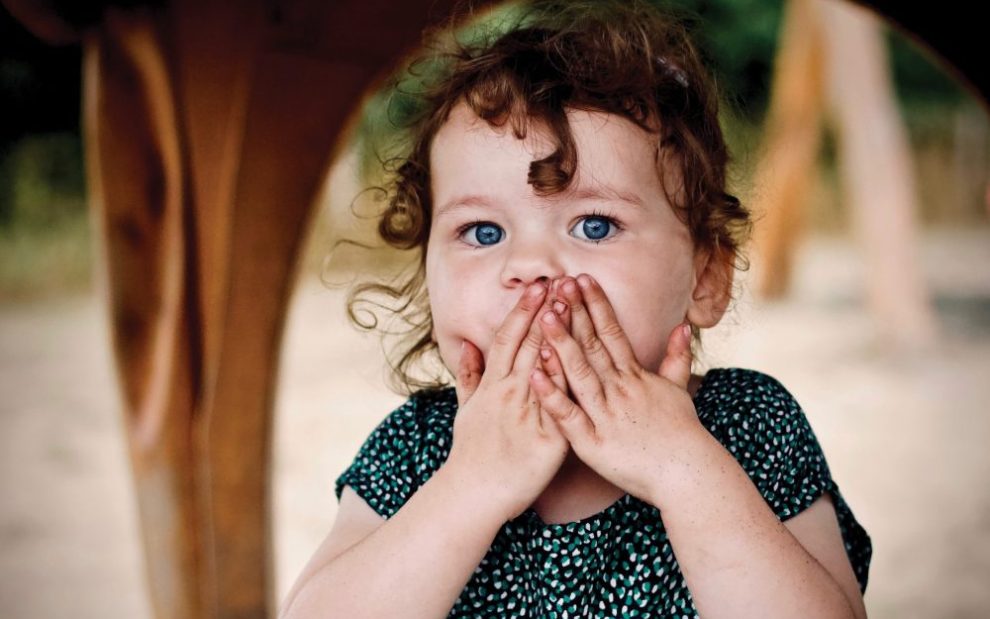I’m an anxious, type A parent in a host of unflattering ways, but for some reason my language use isn’t one of them. I swear a lot, and while I’ve made numerous half-hearted attempts to sanitize my potty mouth, none have stuck. This could be because the proverbial fire under my bum hasn’t been lit (I have yet to hear my toddler utter one of the worser four-letter words), or because I just don’t really care. I have no moral or ethical problems with synonyms for poop. Frankly, I’m much more worried about hearing my daughters imitate my snippy, gossipy, or judgmental comments than I am about hearing them exclaim what a f***ing mess they made in the family room.
While I’m not particularly careful about controlling my cursing in front of my children, there is a different type of language that I don’t use frivolously, and that’s the vocabulary of good fortune.
The “vocabulary of good fortune” is the phrase I’m using to describe the words we wield to explain the positive happenings of our lives. While many words fit into this lexicon, right now I’m thinking of three specifically: blessed, lucky, and privileged. In my experience of everyday listening to the conversations around me, these three words are used interchangeably at times, though more often, “blessed” is used as a catchall term for events and circumstances that would be much better described as luck or privilege. I have serious concerns about this.
The Oxford English Dictionary defines “blessed” as “made holy; consecrated,” though the biblical understanding of the word is a bit more expanded to include someone or something on the receiving end of divine favor. Either way you look at it, being blessed involves the action of God and the specialness of the recipient. With this in mind, it’s pretty easy to roll my eyes when I hear someone say, “I was so blessed to find that parking spot.” While I do believe we can find God in all things, it’s hard for me to imagine that God is micromanaging our traffic patterns. I don’t think this is a particularly controversial opinion. Although #blessed used to be deployed in earnest, I see an ironic use of the hashtag much more frequently these days. There seems to be a collective understanding that it’s a bit goofy to assign a word that signifies “made holy” to your parking spot.
What feels more troubling to me is its use to describe the Really Good Stuff of life: having a baby, receiving a cancer-free outcome, graduating from college, being surrounded by family and friends for an important milestone. As we sense God’s movement in these joy-filled, moving, awesome experiences, I understand the impulse to attribute the goodness to God’s blessing. We didn’t earn our clean bill of health, after all. It was a gift, and we feel favored by God for having received it.
But are we? Are we—the individuals who just got the thing we longed, hoped, and prayed for—actually favored by God? I don’t think so, and the reason why is because I find it unfathomable that God plays favorites. Our Creator loves limitlessly and unconditionally, but when we suggest that the cause of our good fortune is God’s preference for us, we imply otherwise. Better to use the words that actually signify the source of our good fortune—luck and privilege, in many cases—than to suggest that those of us on the receiving end of goodness are held in God’s higher esteem than everyone else.
Luck is the word I would use to describe the cause of positive fortune that happens by chance. I am lucky that I got pregnant easily, and then doubly lucky that I ended up with the two daughters I’ve always longed for. Brides and grooms are lucky when it doesn’t rain on their wedding day, as are the elated winners of the lottery. Luck feels like an important designator because it allows us to acknowledge our good fortune in a way that is less likely to cause hurt to people who are, well, less lucky. God doesn’t prefer me over my friend who is struggling with fertility. I’m just lucky.
Privilege, on the other hand, refers to the good events and circumstances that happen to us because aspects of our identity—our race, gender, sexuality, socioeconomic status, abilities—position us on the receiving end of such things. Unlike luck, privilege isn’t the result of chance. It’s good fortune that all of us could have and should have but that has been denied to entire groups of people through historical and ongoing oppression.
Privilege is knowing that when I get sick, I can easily get to a doctor because I have a car, several urgent care facilities are close to my home, and I don’t have to worry about being stuck with a bill that I can’t afford. Privilege is the awareness that if I get lost while driving, I’ll probably be just fine asking for help because police officers and other community members are generally very kind to white women like me. Privilege is the fact that it’s easy for me to make friends because my education gives me confidence in introducing myself to new people, I’m not worried about assumptions others are making because of how I look or express myself, and I have time to build relationships since I’m not working two jobs to make ends meet.
The problem with misnaming privilege as blessing isn’t just that it suggests God’s preference for some of us over others. It also prevents those of us with inordinate amounts of privilege from acknowledging the ways we benefit from looking the way we look, talking the way we talk, and loving who we love. Everyone should have access to affordable health care, safety, education, and leisure time. Until we name the fact that an entire group of us comes by these basic rights more easily than other groups do, it will be hard to create a more equitable system. Recognizing our good fortune for what it is—privilege—calls us into accountability.
I like activist Peggy McIntosh’s description of privilege as the “invisible package of unearned assets that I can count on cashing in each day, but about which I was ‘meant’ to remain oblivious.” If one of my hopes in parenting is to raise anti-racist justice seekers, I need to raise my daughters to not be oblivious to their privilege. A starting point for this is using the right word to describe their good fortune.
It might seem like I’m being stingy with the word blessed, and it’s true that I think it’s hurtful and dangerous to mistake our luck and privilege for blessing. But if we’re careful not to confuse our good chance for God’s favor, and if we’re unrelenting in our efforts to notice and upend our privilege, then an expansive space opens to recognize the abundant blessings in our lives. Blessings, I think, are all those things that, like grace, are freely given to all people. We become blessed—made holy, divinely favored—when we recognize and respond to the manifold gifts of wonder, astonishment, and love within our lives.
This article also appears in the January 2023 issue of U.S. Catholic (Vol. 88, No. 1, pages 43-44). Click here to subscribe to the magazine.
Image: Unsplash/Jelleke Vanooteghem














Add comment